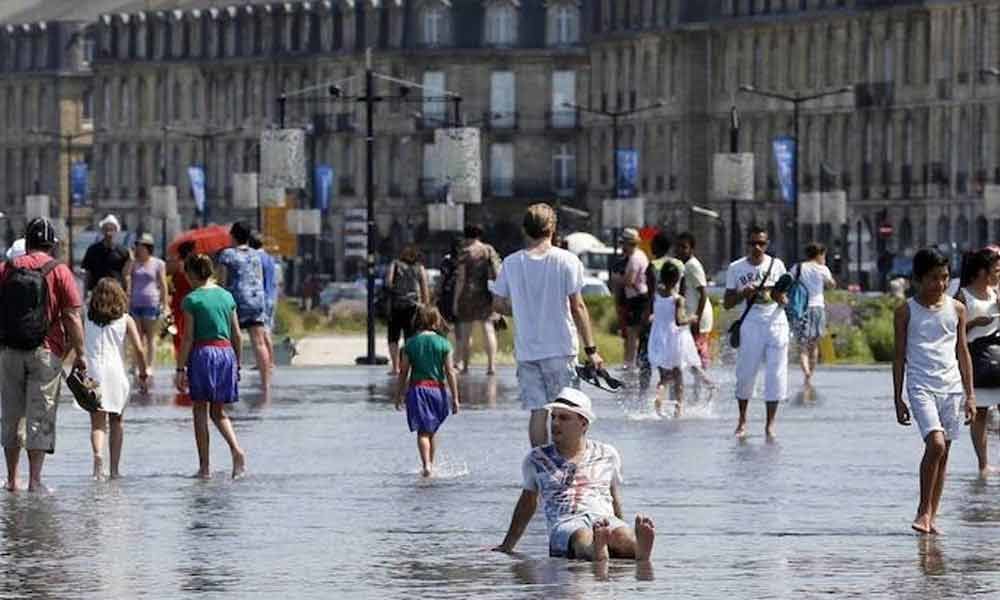Just In
Europe braces for more record temperatures as heatwave hits peak


A ferocious heatwave that has broken temperature records across Europe is set to hit its peak on Thursday, sparking concerns about public health and new misery for rail travellers whose holiday plans have been badly affected.
Paris: A ferocious heatwave that has broken temperature records across Europe is set to hit its peak on Thursday, sparking concerns about public health and new misery for rail travellers whose holiday plans have been badly affected.
After all-time temperature records were smashed in Belgium, Germany and the Netherlands on Wednesday, Britain and the French capital Paris could on Thursday to see their highest ever temperatures. Trains have been slowed in several European countries to avoid damage to the railway networks and French national operator SNCF has urged travellers to delay journeys planned for Thursday. In the Netherlands, farmers have been leaving their cows outside to sleep, rather than bringing them in at night, while Dutch media said hundreds of pigs died when a ventilator failed at Middelharnis. The heatwave, which is expected to ease up on Friday as rain and thunderstorms move in, had again focused public attention on the problems caused by climate change.
Authorities have warned people to keep an eye on those living alone and also to beware of taking the plunge to cool down after a spike in drownings. Hundreds of travellers were stuck on trains in sweltering conditions outside Paris for several hours late Wednesday after a fire on an electrical transformer halted traffic in and out of the Gare de l'Est station in Paris. This came after a failure on an overhead power line had halted train traffic between Brussels and London and Paris. It was not immediately clear if the fault was due to the heatwave but Eurostar warned further disruptions were expected Thursday. "I ask everyone who can avoid or delay their journeys to do so," said French Environment Minister Elisabeth Borne, saying workers who can do their jobs at home should not go to their offices.
"When it is this hot it is not just people in a fragile state who can have health problems," she warned. Paris was expected to see the mercury soar to as much as 41 or 42 degrees Celsius, breaking a 70-year-plus record of 40.4C. Britain's Met Office predicted a chance that the UK record of 38.5C, which was recorded in Faversham, Kent, in August 2004, would also be exceeded on Thursday. The northern third of France, including Paris, was under a red alert while the rest of the country had a yellow warning and water-use restrictions were in force. On Wednesday, the southern Dutch town of Gilze-Rijen experienced 38.8C heat, surpassing a record dating back 75 years. Belgium registered an all-time high since records began of 39.9C at the Kleine-Brogel military base, beating a record that dated back to June 1947.
And Germany's western town of Geilenkirchen recorded 40.5C, beating a previous record from 2015. Paris, in particular, remains haunted by the early summer of 2003 when 15,000 deaths were blamed on the heat and the authorities were bitterly criticised for not mobilising fast enough. "We need to take care of ourselves but above all others especially those who are alone, and be able to detect the first symptoms of heatstroke," said Prime Minister Edouard Philippe.
Local authorities have placed restrictions on water usage in many areas due to drought-like conditions that have seen ground and river water levels fall dramatically. This summer's second heatwave has amplified concerns in Europe that human activity is heating the planet at a dangerous rate. The June 26-28 blast of heat in France was four degrees Celsius hotter than an equally rare June heatwave would have been in 1900, the World Weather Attribution (WWA) team said this month. One study by the Swiss Federal Institute of Technology said the deadly, weeks-long heatwave across northern Europe in 2018 would have been statistically impossible without climate change.

© 2024 Hyderabad Media House Limited/The Hans India. All rights reserved. Powered by hocalwire.com






